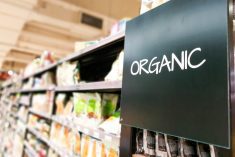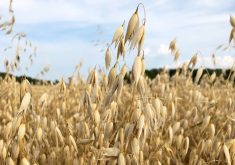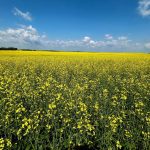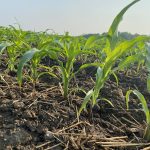When weighed for sustainability, the purported benefits and costs of organic agriculture can actually “vary heavily” from case to case, a new University of British Columbia study finds.
The UBC study, titled “Many shades of gray: The context-dependent performance of organic agriculture,” published Friday in the U.S. journal Science Advances, sets out to “systematically review the scientific literature on the environmental and socioeconomic performance of organic farming.”
The study — led by Verena Seufert of UBC’s Institute for Resources, Environment and Sustainability (IRES) and Navin Ramankutty, UBC’s Canada research chair in global environmental change and food security — was meant to assess “where previous studies agree and disagree,” and to identify “the conditions leading to good or bad performance of organic agriculture.”
Read Also

ICE Canada Weekly: U.S. biodiesel mandate will be a boon for canola
Canola is poised for more gains as the trade awaits the Trump administration’s decision on the latest biodiesel mandate, said Jamie Wilton, broker with RJ O’Brien in Winnipeg.
Organic agriculture shows “many potential benefits,” the study said, as well as “many potential costs including lower yields and higher consumer prices.”
However, the study added, “numerous important dimensions have high uncertainty, particularly the environmental performance when controlling for lower organic yields, but also yield stability, soil erosion, water use, and labour conditions.”
“Organic is often proposed a holy grail solution to current environmental and food scarcity problems, but we found that the costs and benefits will vary heavily depending on the context,” Seufert said.
For example, the report’s authors suggest, in countries such as Canada “where pesticide regulations are stringent and diets are rich in micronutrients, the health benefits of choosing organic may be marginal.”
“But in a developing country where pesticide use is not carefully regulated and people are micronutrient-deficient, we think that the benefits for consumer and farm worker health may be much higher,” Ramankutty said in a UBC release.
Another important measure for a farming system’s sustainability, for another example, is the yield of a crop. Most studies so far have compared the costs and benefits of organic and conventional farms of the same size, the UBC researchers said, “which does not account for differences in yield.”
On average, according to previous research, the yield of an organic crop is 19 to 25 per cent lower than under conventional management, the study says, suggesting “many of the environmental benefits of organic agriculture diminish once lower yields are accounted for.”
“While an organic farm may be better for things like biodiversity, farmers will need more land to grow the same amount of food,” said Seufert. “And land conversion for agriculture is the leading contributor to habitat loss and climate change.”
While organic farms typically consume less energy and produce lower greenhouse gas emissions than their conventional neighbours, a farm’s greenhouse gas emissions “might actually be higher under organic management” when its lower yields are taken into account.
On the matter of water quality, an organic field has, on average, lower nitrogen loss and lower pesticide leaching than a conventional farm, the UBC study said. Organic agriculture also uses more recycled nitrogen and phosphorus, introducing less new nitrogen and phosphorus into water systems.
However, once the organic farm’s lower yields are taken into account, the nitrogen loss per unit food produced “might actually be higher.”
Also, the study said, organic farms where large amounts of animal manure are applied would have a “stronger negative impact on water quality” compared to organic farms that use nitrogen-fixing crops as fertilizers.
Organic’s benefits to biodiversty also may not be as clear as they seem, the study suggested. On average, organic management results in a 40 to 50 per cent increase in organism abundance in agricultural fields. Plants and bees have been shown to benefit the most, while “other arthropods and birds benefit to a smaller degree.”
However, the study said, “we don’t know whether organic agriculture provides any benefits for biodiversity if lower organic yields (and thus probably more land to produce food) are taken into account.”
In terms of producing a sustainable livelihood for farmers and farm workers, the study notes organic agriculture is “typically more profitable than conventional agriculture” — but in regions with high labour costs, those margins may shrink for organic operations, which are generally more labour-dependent.
Furthermore, the study said, “organic farmers in low-income countries are usually dependent on export markets and exporting agents and therefore lose some of their autonomy.”
On organic operations, the study noted, farm workers benefit from reduced exposure to “toxic agrochemicals” and from increased employment opportunities in regions with high rural unemployment. On the other hand, “organic farm workers are likely exploited in similar ways to conventional farm workers.”
Though the study suggests organic alone can’t create a sustainable food future, it still has an important role to play. For consumers, buying organic gives them control over and knowledge of how their food is produced, “since it is the only farming system regulated in law.”
“We need to stop thinking of organic and conventional agriculture as two ends of the spectrum,” Seufert said in UBC’s release. “Instead, consumers should demand better practices for both, so that we can achieve the world’s food needs in a sustainable way.” –– AGCanada.com Network















